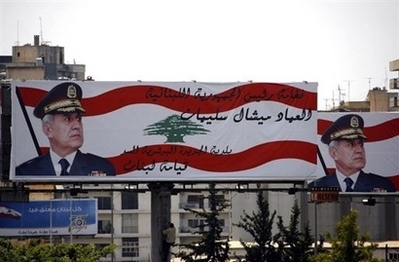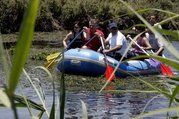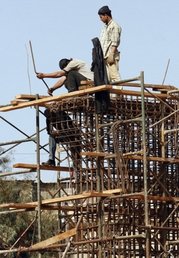JERUSALEM (AFP) – Israel received a report from Hezbollah hat an Israeli airman reported missing in Lebanon since 1986 has been dead …
 Lebanese President Michel Suleiman has set July 9 as a deadline to conclude the formation of a new government in the country, well informed sources were quoted by Xinhua news agency. The president is due to leave for Paris on July 12 to participate in the international conference on Euro-Mediterranean cooperation, the report added, hinting that a new government should be formed before the president leaves. Over five weeks have passed since designated-Prime Minister Fouad Seniora was assigned by the president to form a national unity government, but all efforts were fruitless as Lebanese leaders were unable to reach an agreement on the cabinet line-up.
Lebanese President Michel Suleiman has set July 9 as a deadline to conclude the formation of a new government in the country, well informed sources were quoted by Xinhua news agency. The president is due to leave for Paris on July 12 to participate in the international conference on Euro-Mediterranean cooperation, the report added, hinting that a new government should be formed before the president leaves. Over five weeks have passed since designated-Prime Minister Fouad Seniora was assigned by the president to form a national unity government, but all efforts were fruitless as Lebanese leaders were unable to reach an agreement on the cabinet line-up.
Sources close to Parliament Speaker Nabih Berri, who is in the opposition camp, told a local daily Star that "Prime Minister Seniora' s performance with respect to forming the cabinet lacks transparency." Meanwhile, the ruling majority is accusing Christian opposition Leader MP Michel Aoun of being responsible for the cabinet deadlock because of his demands to get certain key portfolios. The Doha agreement reached on May 21 resulted in the election of a new president after six months of vacancy in the seat.
The second phase of the agreement called for the formation of a national unity government, a step that is not implemented yet.
 KFAR ZABAD, Lebanon (AFP) by Jocelyne Zablit - A decade ago, it was a glittering vision -- a scheme to lure nature lovers to the Lebanese highlands, providing income to local people, nurturing the country's damaged environment and cementing national unity in one stroke. Today, after a war, a political crisis and flareups of sectarian violence, Lebanon's brave experiment in eco-tourism is battered and bloodied but defiantly soldiers on. In the eastern Bekaa region near the Syrian border, financial help from the United States and Europe helped establish a project for encouraging families to come and enjoy the wildlife, staying in local hostels and employing local guides. Ravaged by hunters, the countryside around the village of Kfar Zabad, which straddles the main migration route for African-Eurasian water fowl, was declared a protected area and now teems with birds, along with wildcats and a few river otters. "Before, this place was filled with hunters in the afternoon and all you heard was the sound of gunfire," Mayor Qassem Choker says proudly, pointing to fields near the entrance to the village. "But since the village was designated a protected area in 2004, we can hear the birds chirping again and enjoy our surroundings." The wildlife has emphatically returned. But since the 2005 assassination of ex-premier Rafiq Hariri that marked Lebanon's new plunge into turmoil, the tourists have become an endangered species.
KFAR ZABAD, Lebanon (AFP) by Jocelyne Zablit - A decade ago, it was a glittering vision -- a scheme to lure nature lovers to the Lebanese highlands, providing income to local people, nurturing the country's damaged environment and cementing national unity in one stroke. Today, after a war, a political crisis and flareups of sectarian violence, Lebanon's brave experiment in eco-tourism is battered and bloodied but defiantly soldiers on. In the eastern Bekaa region near the Syrian border, financial help from the United States and Europe helped establish a project for encouraging families to come and enjoy the wildlife, staying in local hostels and employing local guides. Ravaged by hunters, the countryside around the village of Kfar Zabad, which straddles the main migration route for African-Eurasian water fowl, was declared a protected area and now teems with birds, along with wildcats and a few river otters. "Before, this place was filled with hunters in the afternoon and all you heard was the sound of gunfire," Mayor Qassem Choker says proudly, pointing to fields near the entrance to the village. "But since the village was designated a protected area in 2004, we can hear the birds chirping again and enjoy our surroundings." The wildlife has emphatically returned. But since the 2005 assassination of ex-premier Rafiq Hariri that marked Lebanon's new plunge into turmoil, the tourists have become an endangered species.
Foreign tourists and even expatriate Lebanese have been discouraged by fears about safety. The main visitors to the Bekaa are hardy people from Beirut and other regions, who in periods of relative calm grab the chance of a countryside break. "We keep trying to tell people it's safe but the simple mention of the name Bekaa scares them away," said Dalia Al-Jawhary, of the Society for the Protection of Nature in Lebanon, which is heavily involved in the Kfar Zabad project. Faisal Abu-Izzedin, director of the Lebanon Mountain Trail project, a 440-kilometre (275-mile) path that cuts through 75 villages, many of them in remote areas stretching from the north to the south, says Lebanon offers unique treasures. "Nowhere else can you see this diversity," he said. "Our aim was to revive an ancient heritage which was a trail that connected villages. We hope that the trail and people who walk the trail will shine a light on the importance of keeping Lebanon beautiful." From the beaches along the Mediterranean, to mountains, forests, wildlife, Roman ruins and gorges -- all within a few hours' drive or walk -- the country of 10,425 square kilometers (4,170 square miles) indeed has much to offer. "Lebanon has been classified among the 25 top countries in terms of biodiversity," said Pascal Abdallah, who heads Responsible Mobilities, an eco-conscious tour company. "We have 40 kinds of wild orchids, two or three of which are endemic to Lebanon. "We still have wolves in this tiny country, we have a type of hyena that only exists in the eastern part of the Mediterranean -- and of course we have the cedars."
 BEIRUT (AFP) - The Ottoman-style mansions, with Venetian windows, arches and lavish gardens that once epitomised Beirut are being levelled one after the other as high-rises mushroom across the capital. "Now everyone is looking for towers, because they realise that above the tenth floor you can see the sea," says Mona Hallak, an architect and an activist with the Association for the Protection of Sites and Old Buildings. "In 20 years' time, this won't be the case because you will have lots of towers everywhere." As a result, landlords are rushing to take advantage of the high prices now being offered for the land on which their ancestral homes are sitting. The pattern is set: the home is demolished, its traditional garden destroyed and the land sold and developed. "Every time an old house goes, a green pocket goes and with it go trees that are often hundreds of years old," says Hallak.
BEIRUT (AFP) - The Ottoman-style mansions, with Venetian windows, arches and lavish gardens that once epitomised Beirut are being levelled one after the other as high-rises mushroom across the capital. "Now everyone is looking for towers, because they realise that above the tenth floor you can see the sea," says Mona Hallak, an architect and an activist with the Association for the Protection of Sites and Old Buildings. "In 20 years' time, this won't be the case because you will have lots of towers everywhere." As a result, landlords are rushing to take advantage of the high prices now being offered for the land on which their ancestral homes are sitting. The pattern is set: the home is demolished, its traditional garden destroyed and the land sold and developed. "Every time an old house goes, a green pocket goes and with it go trees that are often hundreds of years old," says Hallak.
"It's not only the house. It's the tree. It's the bird that follows the tree. It's the quality of life." The only law on the books that protects old homes in Lebanon dates back to 1933 when the country was under French mandate. It mainly protects buildings constructed before 1700 although younger buildings can be placed on the list of protected sites either by government directive or private initiative. "The law basically focuses on the protection of archaeology and antiquities," Culture Minister Tarek Mitri told AFP. A survey commissioned by the government in 1997 identified about 250 buildings in Beirut that cannot be demolished. "The list is outdated now," Mitri said. "Plus it was done hastily. Some buildings that should be on it aren't." The list is of little consolation to activists like Hallak, who say the issue is more about preserving the country's heritage than merely saving a building or a mansion. "It's important to save an entire street, what we call a cluster... there is a social structure that is completely tied to these buildings," Hallak says.
Khazen History


Historical Feature:
Churches and Monasteries of the Khazen family

St. Anthony of Padua Church in Ballouneh
Mar Abda Church in Bakaatit Kanaan
Saint Michael Church in Bkaatouta
Saint Therese Church in Qolayaat
Saint Simeon Stylites (مار سمعان العامودي) Church In Ajaltoun
Virgin Mary Church (سيدة المعونات) in Sheilé
Assumption of Mary Church in Ballouneh
1 - The sword of the Maronite Prince
2 - LES KHAZEN CONSULS DE FRANCE
3 - LES MARONITES & LES KHAZEN
4 - LES MAAN & LES KHAZEN
5 - ORIGINE DE LA FAMILLE
Population Movements to Keserwan - The Khazens and The Maans
ما جاء عن الثورة في المقاطعة الكسروانية
ثورة أهالي كسروان على المشايخ الخوازنة وأسبابها
Origins of the "Prince of Maronite" Title
Growing diversity: the Khazin sheiks and the clergy in the first decades of the 18th century
Historical Members:
Barbar Beik El Khazen [English]
Patriach Toubia Kaiss El Khazen(Biography & Life Part1 Part2) (Arabic)
Patriach Youssef Dargham El Khazen (Cont'd)
Cheikh Bishara Jafal El Khazen
Patriarch Youssef Raji El Khazen
The Martyrs Cheikh Philippe & Cheikh Farid El Khazen
Cheikh Nawfal El Khazen (Consul De France)
Cheikh Hossun El Khazen (Consul De France)
Cheikh Abou-Nawfal El Khazen (Consul De France)
Cheikh Francis Abee Nader & his son Yousef
Cheikh Abou-Kanso El Khazen (Consul De France)
Cheikh Abou Nader El Khazen
Cheikh Chafic El Khazen
Cheikh Keserwan El Khazen
Cheikh Serhal El Khazen [English]
Cheikh Rafiq El Khazen [English]
Cheikh Hanna El Khazen
Cheikha Arzi El Khazen
Marie El Khazen